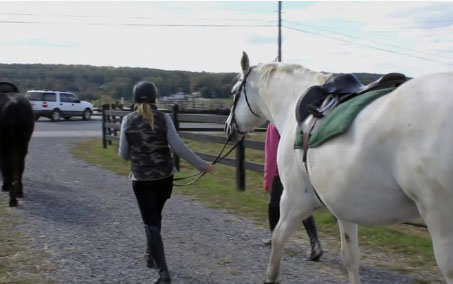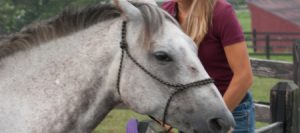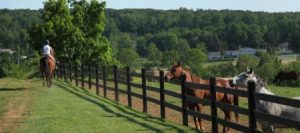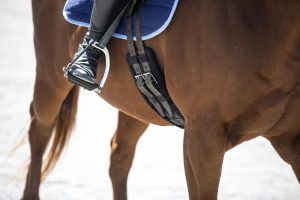Respect is a hot topic in horse training. It’s easy to accuse a horse of being disrespectful and it is often attached as a kind of label on that horse. While there are times horses act in ways that could be described this way, what I have been wondering lately is this – how do we really know whether a horse is being “disrespectful”?
We may give a list of signs, such as coming too close to us, ignoring us when we are making a request, or trying to pull on the lead rope and reins and just plain run away. Or we may say it’s just a feeling we get, that we just know the respect isn’t there.
Many cases of “disrespect” in horses can be the result of a horse that very simply doesn’t know what he is supposed to do. We often put unreasonable expectations on horses – thinking they should just know what we want, without really stopping to consider if they truly understand what we’re asking them for.
I think we also need to be wary of those feelings we get, those times where we think we just know something. It’s not that we shouldn’t be aware of what we feel, but if we consider how our brains work and what triggers those feelings, we realize that many of our thoughts are formed unconsciously and we perceive the world around us today through the lens of what we have experienced in the past.
Unless we work to consciously change our thought patterns, we will continue to think, act, and make assumptions and decisions according to what we are taught, what we are used to seeing and doing, and how we are used to feeling about things every day.
Bringing this back to the discussion of respect, consider how different human cultures around the world show respect. One of the most obvious ways of non-verbal communication that humans have between each other is through eye contact. Here in the United States, it is considered rude if a person fails to make eye contact when meeting another person or during a conversation. In other cultures, especially some Asian cultures, it can be just the opposite and steady eye contact with a person of authority would be considered very disrespectful.
In other words, if I were to travel to Asia without having this knowledge, I might get the feeling that the people there were not only disinterested in what I had to say but also quite rude. However, this feeling would simply be a result of my own internal programming and expectations of eye contact to signify interest and respect, not a fair judgment of the people I was meeting there.
Where I am going with this is that I believe we do the same thing with our horses. We have our own human notions of what respect means and what it should look like, and those expectations probably vary a bit for each of us.
In the end, I believe we should become as aware as we possibly can about our own internal programming and expectations of others – people and horses. Before putting a label or judgment on another, it would be of greater benefit for us to consider other drives for their behavior (do they even understand us, are we being consistent, is the request clear, are they simply scared, upset, bothered, etc.) as well as re-assessing our own thoughts and feelings on that behavior.
What are your thoughts?
See you in the comments,
Callie















16 Responses
Hi Callie,
I enjoyed your very thoughtful blog about what people consider to be ‘respectful’ when it comes to horses. Agree entirely that most often the horse just doesn’t know what we want it to do. Usually the reason they don’t know is because we haven’t taken them through a careful, thin-sliced program to teach them what we would like them to do when we give a particular signal.
Horses are so perceptive, that if we are not clear and consistent with our signals, we come across as ‘mumbling’ and the horse tries to understand us but eventually gives up if we can’t be clear enough. Often he then gets ‘disciplined’ and has no idea why that happened.
People tend to forget that their horse is captive to an alien species and most of the things we want a horse to do are totally foreign to anything that a naturally living horse would ever do.
Cheers, Hertha
A very interesting and thought-provoking post.
I think you make a lot of good points and I think we as humans try to “humanize” an animals thoughts or actions. There are probably various reasons for their action/inaction, many of which we haven’t considered, and most likely many of which are not the reason for their behavior.
This post is a good reminder for us all. Thanks.
By the way, my apologies for the incorrect subject line in your email for this week! I sent the email as I was rushing out to work with the 4H group and I completely forgot to change it – sorry aobut that!
Well spoken, Callie. When people show more respect and compassion to others, including our animals, the world will be more harmonious and peaceful!
I am thankful for this perspective and for the comments. We are different than horses, not made to think, act, or react alike. They have different fears, modes for learning, different ways of showing affection as well as respect, and they are definitely not like my dog. They have taught me more than I have taught them. I’m getting alot out of this blog. Thanks to you all.
Hi Miche, Glad you are enjoying the blog, thanks for your comments!
hy Callie . thank you for the blog.i share the same thoughts as you and the other readers. all too often we humanise horses, it is simple but not easy to try and find the problem in our selves. the horse really offers in his very being and with all his behaviour this chance every moment. personally it is my way to mindfullness. as i am asked to be present in each moment ,open minded and with a loving heart.this also means i acknowledge when a horse is so called disrespectful .if he walks all over me i am not showing respect for myself either and how do i fix this?here is where the choice comes in ,the willingness to learn, communicate , apply. its a way of life.
by the way how wonderful you have made such lovely contacts over this blog and are visiting them:)
Dear Callie,
Thank you for all of your good advice and the information you provide in such a clear and thoughtful way.
I have a unique situation in that I do not have a lot of land or a big barn. In fact, I am referred to as “the Backyard Horsekeeper” and have been told that I shouldn’t have a horse. My neighbors all have acreage and have several horses. My horse sees them but does not have direct contact with them. One neighbor has graciously allowed me to ride in one of her fields. Most of the time I spend with my horse is in the barn, and in my back yard which has been totally dedicated to him. I spend hours with him every day, leading, lunging, riding in the back yard and now and then in the field, grooming him, teaching him and just enjoying being with him.
I have been told that keeping a horse in this environment is cruel because he has no other horse for companionship. I am 56 years old and have dreamed my whole life of having a horse. He is not an easy horse to ride as he is very forward moving and I had only ridden three times on a trail with others. I have found your training sessions to be very helpful and more informative than in-person lessons. My question to you is:
Do you think I am sacrificing my horse’s happiness for my own? I value your opinion and would appreciate your advice. I would move if I could afford another place for him with room to have another horse or two. Unfortunately, at 56, this may not be an option.
Thanks so much, Callie.
Hi Patty, this is tough to answer – horses certainly prefer companionship and are generally healthier when they have room to exercise. This doesn’t mean your horse can’t be healthy in your backyard but it does put more responsibility on you to keep him exercised.
I would pay close attention to his behaviors – does he show signs of stress or boredom (pacing, chewing or cribbing on things, calling for other horses)? Does he look or feel anxious or stressed to you?
If so, you could try other types of companions for him. Even another animal such as a goat, a donkey, or a mini horse could potentially give him companionship.
Hope this helps, callie
Hello Callie! Thanks for this article. You are so perceptive and it’s great that you’ve gotten so many others to stop and think a little too. I personally feel that my horse speaks much better human than I speak horse. I am trying to listen, and I find that he tries harder when I do. Thanks for your thoughts.
-Brooks
I have been told-repeatedly- that my horse does not respect me when he invades my space without being invited. I don’t care if he respects me. I CARE that he listens to me and does what I ask him to do. I need to be aware of my horse at all times when I am with him. There are times when I want my horse to come to me and there are times when I don’t. If he starts to invade my space when I don’t want to I can hold up my hands and say whoa. Or I can wiggle the lead rope to ask him to back. When my horse is in the field I want him to come to me so I can put his halter on.
For me it is more about obedience than respect.
Thank you for another insightful article! Viewing our horses’ behaviors from a horse’s perspective can guide our own behaviors for sure.
I have a mare who’s so pushy, you can shake the lead rope or use a crop whip to back her up and she won’t have it. When I get on her and chase her off she turns and tries to kick you.
Hi Daisy,
Perhaps she has never learned to back away from pressure and instead has learned to release the pressure by pushing through it. I would try putting her in a stall or confined space and patiently teaching her that tapping with the whip, swinging with the rope, etc. means back away. A confined space simply means that it limits the other options for movement and you can even stand in front of the door or window (depending on how the stall is set up) so that she cannot push into you. The idea is not to use so much pressure that she gets amped up, but just to teach her what you mean by the rope or crop.
I will give that a try. All my horses (3) are rescues and they have their little quirks but I just adore them. She’s a stubborn one but your I believe your training has helped a lot. I need to keep at it.
Thank you so much for the reply.
Daisy